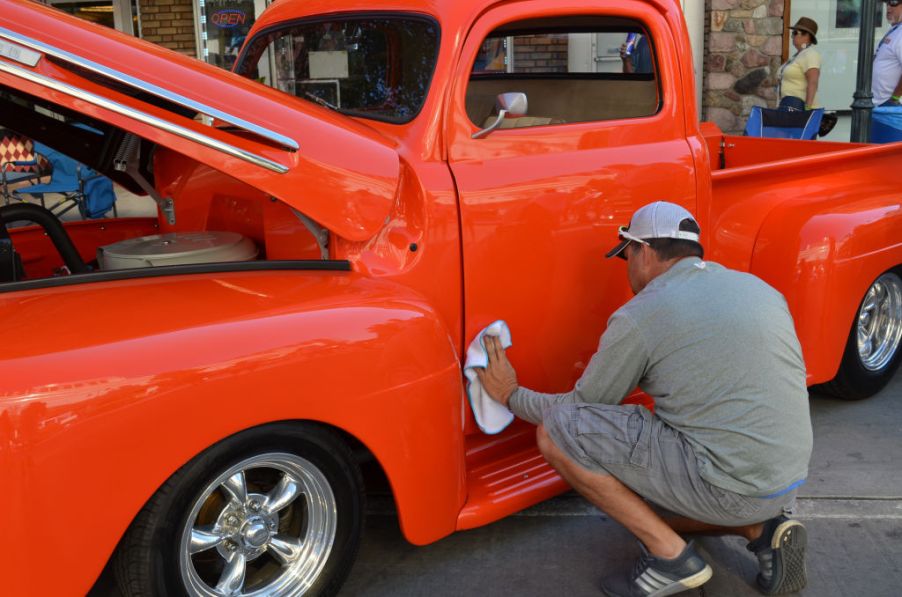
Do Truck Owners Love Ford or Chevy More?
For what seems like forever, Ford and Chevrolet truck owners have been engaged in the loyalty wars between the two brands. But a new survey conducted by CarGurus reveals surprising information about their attitudes about these brands. We’ll also look at social media and other studies to find out who loves their trucks more: Ford or Chevy owners.
The CarGurus survey
The PR Newswire site provided key details of CarGurus’ 2019 “Truck Sentiment Survey”. In it, CarGurus interviewed 1,067 truck owners to capture their feelings about their trucks and their brands.
Generally, brand loyalty decreased slightly among pickup truck owners as compared to 2018. 70% of them said that they would change brands if their preferred brand increased truck prices by $10,000 this year. This is a 6% increase over 2018.
The most loyal owners were those who currently own Toyota trucks. 41% were unwilling to consider another truck brand. Current owners of Chevy trucks were the least satisfied with their brand, with 28% that were unwilling to consider another truck brand. Ford owners were close behind at 27%.
Other aspects of the survey brought additional insight into the way truck owners felt about their brand. 68% of them thought that their trucks were overpriced. 48% felt that trucks weren’t as well-made as they once were. On the other hand, 54% liked their trucks’ high-tech features.
And some 17% of the truck owners interviewed said that they wouldn’t buy another pickup truck in the future. Of those former truck owners who already moved on to another category, 37% currently owned an SUV or crossover. 35% of those surveyed now own a sedan.
Brand loyalty numbers from social media and two studies
From the CarGurus survey findings, it’s clear that the luster of owning a Chevy or Ford truck has worn off for at least some drivers. But brand loyalists still make their presence known in social media and other studies. And between the two brands, Ford has a slight edge.
At the time of this writing, the Ford Trucks page on Facebook showed 1,764,406 followers while 1,729,407 follow on the Chevy Trucks page. On Twitter, the Ford Trucks page has over 201,000 followers. Twitter followers for Chevy Trucks, comparatively, number around 124,000.
So, if social media reveals that Ford trucks seem to have a somewhat more loyal following, do any other recent studies out there support or disprove this? J.D. Power released a report this year that examined brand loyalty.
This study collected data on the share of drivers who bought the same brand of vehicle as their previous one over the past year. And it reviewed vehicles across all categories, not just trucks.
Subaru ranked first in the report with 61.5% of owner loyalty. As for the two truck contenders, the study ranked Ford in fifth place with 54.0% in loyalty ranking. Chevrolet was seventh in loyalty ranking at 49%.
What else did we learn from the survey?
In 2018, CarMax surveyed used vehicle buyers to learn more about brand loyalty. These buyers are, as CarMax points out, not especially loyal to begin with, with only 19.4% buying the same brand as their trade-in. For those buyers who did buy the same brand, Ford owners ranked third at 26.1%. Chevy owners ranked seventh with only 22.5%.
Another part of the CarMax survey that looked at which car makes owners bought for a second time was revealing. In fifth place was the Ford F-150 at 19.6%. Trailing behind Ford in eighth place at 17.0% was the Chevrolet Silverado 1500.
The numbers from these studies compare positively to the numbers of social media followers. Ford truck owners love their pickups just a tad more than Chevy owners. Perhaps, as the CarGurus survey suggests, price is a factor that keeps some Chevy owners from coming back.
Another factor may be that some Chevy truck owners are switching to Ram trucks, as this year’s rising sales figures for the truck indicate. Sales figures also show that Ford truck owners seem less tempted by the Ram’s appeal.
Regardless of what’s at play in truck owners’ shifting loyalty, it’s evident that a growing number of them don’t feel compelled to buy their brand a second time around. We hope that both Ford and Chevy are paying attention to this news.


